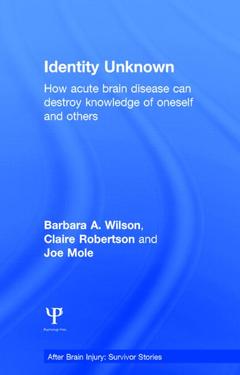Identity Unknown How acute brain disease can destroy knowledge of oneself and others After Brain Injury: Survivor Stories Series
Auteurs : Wilson Barbara A., Robertson Claire, Mole Joe

Imagine being unable to recognise your spouse, your children, or even yourself when you look in the mirror, despite having good eyesight and being able to read well and name objects. This is a condition which, in rare cases, some brain injury survivors experience every day.
Identity Unknown gives an exceptional, poignant and in-depth understanding of what it is like to live with the severe after-effects of brain damage caused by a viral infection of the brain. It tells the story of Claire, a nurse, wife, and mother of four, who having survived encephalitis, was left with an inability to recognise faces ? a condition also known as prosopagnosia together with a loss of knowledge of people and more general loss of semantic memory
Part One describes our current knowledge of encephalitis, of perception and memory, and the theoretical aspects of prosopagnosia and semantic memory. Part Two, told in Claire?s own words, is an account of her life before her illness, her memories of the early days in hospital, an account of the treatment she received at the Oliver Zangwill Centre, and her description of the long-term consequences of encephalitis. Claire?s profound insights, clear writing style, and powerful portrayal of her feelings provide us with a moving insider?s view of her condition. These chapters also contain additional commentary from Barbara Wilson, providing further detail about the condition, treatment possibilities, potential outcomes, and follow-up options.
Identity Unknown provides a unique personal insightinto a condition which many of us have, for too long, known too little about.It will be of great interest to a broad audience including professionals working in rehabilitation settings, and all those who have sustained a brain injury, their families and carers.
PART ONE 1. Encephalitis2. An introduction to visual perceptual disorders and to the agnosias 3. Theoretical Accounts of Prosopagnosia4. The Self and Identity PART TWO 5. Life before the illness: Claire’s account6. Calling my husband Stephanie7. Kissing a cauliflower8. Together we can9. The red group - ‘learning to belong to my own life’10. A face is not a person11. Strategies that have helped12. Can you believe your eyes? Sight difficulties following encephalitis13. ‘Metallic not sour’ and pieces of the jigsaw14. Paddling through the river and stepping on stones: An Overall Summary of my Life Since Encephalitis 15. Final last thoughts
Barbara A. Wilson is a neuropsychologist and founder of the Oliver Zangwill Centre for Neuropsychological Rehabilitation in Ely, UK. She has worked in brain injury rehabilitation for over 35 years and has published 21 books, 270 journal articles and chapters and 8 neuropsychological tests. Among her many awards she has an OBE and two lifetime achievement awards. She is the editor of the journal Neuropsychological Rehabilitation, which she founded in 1991.
Claire Robertson is a nurse, mother, wife and friend. She qualified as a State Registered Nurse, a Sick Children’s nurse and a nurse for Special and Intensive Care of the Newborn. She survived Herpes simplex encephalitis in 2004, which left her with a very severe loss of knowledge of people and their identity. She regularly gives talks about her difficulties and the experience of life after brain injury.
Joe Mole is a psychology assistant at the Oliver Zangwill Centre for Neuropsychological Rehabiliation in Ely, UK. He is currently involved in research into the neuropsychology of face recognition, navigation and time perception.
Date de parution : 10-2014
13.8x21.6 cm
Date de parution : 10-2014
13.8x21.6 cm
Thème d’Identity Unknown :
Mots-clés :
herpes simplex encephalitis, prosopagnosia, rehabilitation, neuropsychological rehabilitation, Oliver Zangwell, Barbara Wilson, The Man with a Shattered World, Alexandra Luria, Oliver Sacks, The Man Who Mistook his Wife for a Hat, Cognitive Behaviour Therapy, Acquired Brain Injury, IAC, Herpes Simplex Encephalitis, Apperceptive Agnosia, Neuropsychological Rehabilitation, OZC, Associative Agnosia, Barbara’s Comments, Face Blindness, Semantic Information, IAC Model, Herpes Simplex Viral Encephalitis, Fusiform Face Areas, Semantic Dementia, Friendship Book, ATL Atrophy, Visual Object Agnosia, Category Specific Semantic Deficits, TBI Patient, Em’s Ability, Acquired Prosopagnosia, PINs, AL’s Performance, Normal Face Perception



